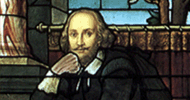

 |
 |
| Authorship | The Playhouse in Printing House | Publishers, Printers, and the Printed Book | ||||||||||||
| Publishers, Printers, and the Printed Book | |||
| Margins | ||
|
The margins of early modern books were often used by authors to cite authorities and to engage in some of their more charged arguments. Printed marginal notes were a way to influence a reader's understanding of a text, by interpreting it for them, signaling its importance or sources, or even undermining its apparent meaning. In Thomas Heywood's "The Prologue to the Stage, at the Cocke-pit," in The Jew of Malta (1633), the printed marginal notes indicate the references intended by the Prologue. Readers are told that "the best of Poets" refers to "Marlo" (Christopher Marlowe, the play's author), "the best of Actors" to "Allin" (Edward Alleyn, the actor who originally played Barabas), and "him who doth personate / our Iew this day" to "Perkins" (the actor Richard Perkins, who John Webster also singled out for praise in The White Devil). The Geneva Bible (1560) has perhaps the most famous marginal notes of the period. And unlike Heywood's rather innocuous glosses, those in this bible were the subject of controversy almost as soon as the book was published. Archbishop Parker instructed the translators of the Bishops' Bible (1568) "to make no bitter notis [i.e. notes] vppon any text, or yet to set downe any determinacion in places of controversie." King James similarly objected to the notes in the Geneva Bible. At the Hampton Court Conference in 1604, at which he reportedly gave directions for the Authorized Version (or King James Bible), he ordered "no marginall notes should be added, hauing found . . . some notes very partiall, vntrue, seditious and sauouring too much of daungerous, and trayterous conceites." One of the notes he singled out was that on Exodus 1.19, which he said "alloweth disobedience to Kings." In Histriomastix. The Players Scourge, Or, Actors Tragedie (1633), William Prynne uses printed marginal notes for a variety of purposes. Like modern footnotes, his marginal notes often cite sources or provide information not in the text itself. In his address "To the Christian Reader," for example, he objects to the recent publication of plays in folio, which a marginal note informs us are the folios of Jonson, Shakespeare, "and others." These folios are selling so well that "they are now (e) new-printed in farre better paper than most Octavo or Quarto Bibles"; the marginal note reads, "Shackspeers Plaies are printed in the best Crowne paper, far better than most Bibles," a wonderful bibliographical critique of the Second Folio of Shakespeare (1632). Prynne further protests the recent surge in printed plays, which he informs his readers in yet another marginal note, "Above forty thousand Play-bookes have been printed and vented within these two yeares." While we might be inclined to dismiss Prynne's estimates as the product of paranoia, they in fact are remarkably accurate. From 1630 to 1632, more playbooks were published than in any other three year period up to that point (79 in total). In 1631 and 1632 alone, 52 plays were published, and if we assume a normal print run of about 800 books per edition, about 40,000 plays would have been printed in those two years. Prynne was sent to the Tower in February 1633, and then called before the court
of the Star Chamber in February 1634. He was not imprisoned, though, for simply
writing against plays, but partly for an exceptionally ill-timed index entry.
The printing of Histriomastix was completed in October 1632, and about
ten weeks later Queen Henrietta Maria performed in The Shepherd's Pastoral
by William Montague. In the index to Histriomastix, Prynne included the
following entry, "Women-Actors, notorious whores," surely one
the most unfortunate index entries ever. Prynne plausibly argued that he could
not possibly have been referring to the Queen in that entry because the play
was printed before the Queen ever participated in Montague's masque. But Prynne
was punished anyway by the Star Chamber with life imprisonment, a fine of 5,000l.,
and the cropping of both his ears. |
Images: Columbia
Rare Book & Manuscript Library
Technology: Columbia Center for New
Media Teaching & Learning